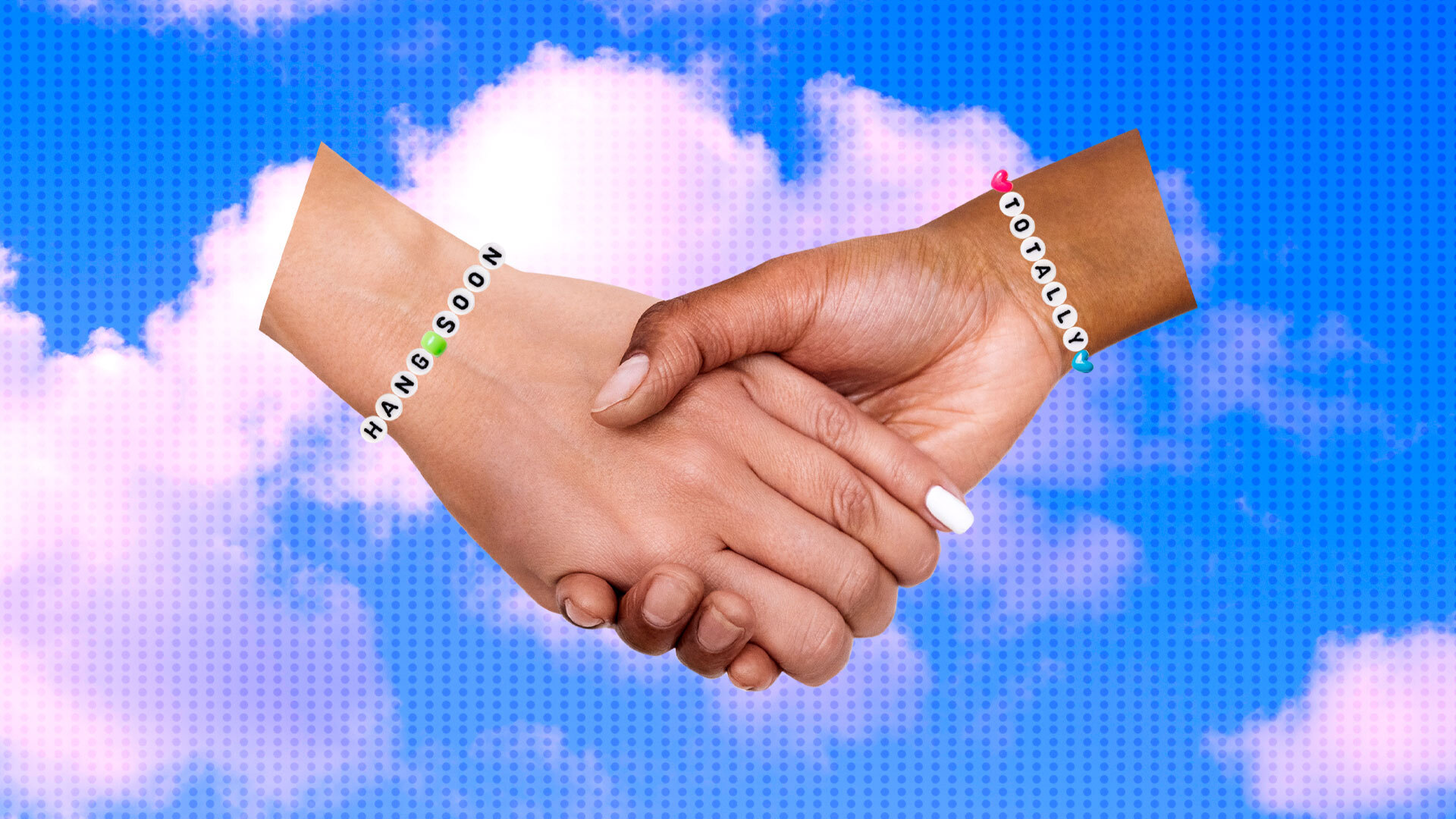It’s 7:58 pm on a Friday night, and my phone dings. “Hi! Hi! So sorry to do this last minute, but I can’t make it tonight. I need a night in!” I put the makeup brush down and sigh. Some might be overjoyed in this situation, the chance to stay in after a long work week. But is it wrong if I admit I’m disappointed? Is it wrong that I was actually looking forward to seeing a friend I made plans with weeks in advance because our schedules were too full to enjoy a spontaneous happy hour?
I’m gonna say something that might piss some people off. It’s really fucking annoying when friends “need a night-in to recharge” when it comes at the cost of a last-minute cancellation. Oops! I said the quiet part out loud. But hear me out: Regularly canceling plans at the last minute isn’t “self-care,” it’s just rude — and it’s eating away at our relationships.
And I’m not the only one to feel this way. TikToker Ashley McGovern took to the app to air out her grievances about what she dubbed the “noncommittal trend” that’s taken over our social lives (or lack thereof). Ashley described a friend who spent lots of her “time, money, energy” to create a 2025 vision board event, only for four of the girls to drop out at the last minute. A similar experience happened to influencer Bria Jones, who shared via TikTok in early January that a good chunk of her guest list canceled an HOUR before her baby shower. “This is why I hate celebrating myself,” Bria says while crashing out in her bathroom. Because, yeah, I would be hesitant to host, too, if I couldn’t trust my RSVP list to show up.
@ashleymcgovern_ People show you who they really are in these moments! #noncommittal #friendtoftiendadvice #briajonesbabyshower #briajones ♬ original sound – Ashley McGovern
Lately, it feels like the threshold for canceling plans has dropped to vague excuses of prioritizing mental health. “Life is busier and more demanding than ever, and with the wave of social media promoting self-care and advocating for us looking after our wellbeing by topping up our social battery with alone time, it can be easier to opt out of events — even if it means missing out on connecting with friends,” Niyc Pidgeon, positive psychologist and author of One More Day, tells Betches.
Consider the rise of “therapy speak,” a clinical way of communicating boundaries and advocating for our needs that has become heavily satirized online. Need an example? “Hey, I can’t come to your birthday tonight. I need to honor my personal boundaries and conserve my emotional bandwidth. I’m at capacity right now,” content creator Pooja Tripathi says in a viral therapy speak parody that feels way too real.
And, like, sure! Protect your peace, girl! Except, actually, fuck your peace. Emotional labor is how you connect with people. If we’re besties, I’m gonna need you to be there for me when you say you will. And no, I don’t want more communication. Telling me five minutes before a dinner reservation that you’re “just not in the mood” may be more transparent, but honestly? I’d rather you lie and come up with an elaborate excuse to save my tender feelings. You might be taking care of yourself, but you certainly aren’t being a good friend by keeping me on standby.
Of course, I say this all with a grain of salt. There’s plenty to caveat. Rest is a valid need, and according to Pidgeon, sleep and restoration — along with looking after our fitness and nutrition — are the main elements associated with great physical and mental health. I don’t deny that self-care is important, but when does choosing to stay home and opting out of plans start to stack against you — and affect the people you love? Are we risking the chance to lean on our community by always choosing to binge Netflix over time with friends? Let’s investigate.
Is Canceling Plans Actually Self-Care?

Just in case you missed literally every wellness TikTok, we’re in the midst of a loneliness epidemic right now. More than 60% of Americans say they’re struggling with loneliness to the point it interferes with other areas of their life. Perhaps the “cancel culture” we should be more concerned with is how social media has influenced how we view canceling plans and self-isolating as a good thing. I know my FYP loves to affirm my desire to stay home and bed rot.
“Hustle culture is over, and with the ‘soft girl era‘ being popularized online, it definitely seems easier to give ourselves permission to rest,” Pidgeon says. For those unfamiliar, the soft girl era is basically the rejection of the girlboss energy of the 2010s. It’s choosing early morning Pilates over late nights out. It’s prioritizing self-care and avoiding burnout — which is not inherently a bad thing! However, it may come at a cost.
“There’s a threshold where isolating alone can become more detrimental to our wellbeing because we miss out on the vast positive benefits of social connection, shared experience, and having a sense of belonging,” Pidgeon explains. “Even having one person to open up to and invest time with has proven to boost wellbeing, happiness levels and even longevity too.”
TBH, canceling plans when you’re not in a good mental space isn’t always the answer. Sometimes, it’s about weighing how you feel in the moment against the possibility that just maybe it’s worth it to push through the current discomfort in order to make or maintain the relationships in your life.
If You’re Struggling With Constantly Canceling, Ask Yourself Why
Take a look at TikToker Daniel Bennett. He doesn’t need to cancel, he can’t even make plans to begin with. The 28-year-old has a series called “Can I Make Plans With My Friends With Less Than A Week’s Notice” and more often than not, it doesn’t end with a cal invite. The people in our lives only get busier as we get older, which is why following through on plans is essential in maintaining these relationships.
@dxnielbennett Go show face somewhere #millennial #friends #advice #friendship ♬ original sound – Daniel Bennett
Bennett’s strategy? Whether it’s dinner or a night out, simply show up. “It’s the idea that if you’re invited to something, you go,” he explains in a recent TikTok. “It doesn’t matter how long you stay for when you go somewhere, it just matters that you show face… Just showing up means exponentially more than not showing up at all.”
While I would argue that you don’t have to say yes to every invite you receive, I agree with Bennett’s mentality of “just show up” when you can. RSVP’d to your friend’s birthday? Just show up. Agreed to coffee with a work bestie? Just show up. Admittedly, it’s easy to be inundated by countless requests for our time. But that’s where prioritizing the relationships we care about matters. Nothing replaces showing up for the people in our lives, so setting boundaries around who we give our time to is a crucial part of managing our social calendar. You simply can’t say yes to everything. Because if you do? You’re bound to cancel 90% of it anyway. By being a bit more selective, you can follow through on the commitments you want to make. (Real emergencies aside.)
That said, if you’re a chronic flake, perhaps the issue is larger than just “pushing through” it. Frequently isolating can be an early warning sign of something more serious going on, Pidgeon emphasizes — such as seasonal affective disorder or depression.
“If you or a loved one are feeling run down or are struggling, it can be easy to want to retreat and be on your own,” she says. I mean, we all need space to recharge. “However, if you’re noticing a friend who isn’t enjoying their social activities as much as they used to, or they seem to be spending too much time alone, this can be an indicator that something might be up.”
Pidgeon suggests identifying those in your life who help uplift you and intentionally investing in these relationships to protect your mental health. “It might feel like staying home is the best thing for you at the time, and it might well be for some of the time, but isolating ourselves isn’t always healthy,” Pidgeon says.
So, next time you’re about to hit send on that last-minute text, consider the benefits of following through. You might be pleasantly surprised — or at the very least, you don’t have to worry if anyone is passive-aggressively writing a whole feature about you. Think about that, Sara! I hope I see you at my birthday party! xoxo
In October 2024, Betches originally published the feature “Chronic Canceling Is A Plague On Our Friendships” as part of the Canceled Plans Issue.




















































